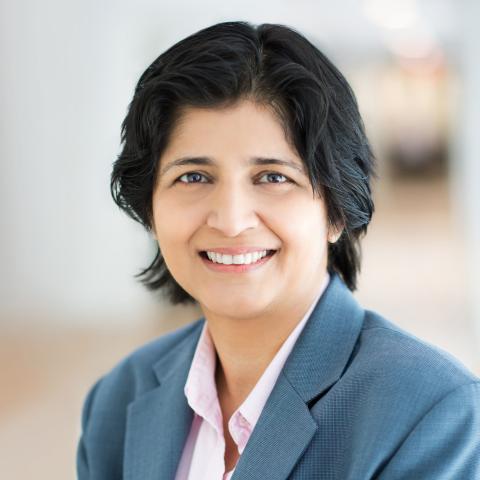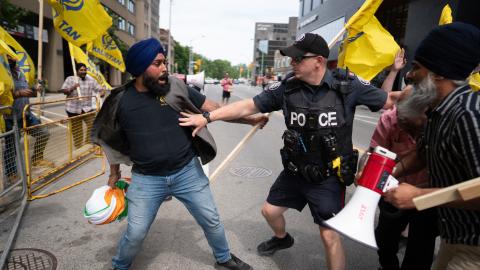India and the United States both do not want their recent spat over an alleged murder plot against a US-based Khalistan activist to disrupt what is otherwise a burgeoning partnership. But Indians, like Israelis, would like American assurances of acting against terrorists who threaten their country just as the US wants its allies to act against those threatening America’s security.
Recent high-level visits to India by American officials have focused on reports about the US foiling an alleged plot involving Indian nationals to assassinate an American Canadian dual citizen who advocates secession of India’s Punjab state and is identified as an instigator of terrorism by India. This came just two months after Canadian Prime Minister Justin Trudeau voiced suspicions that Indian authorities might be linked to the killing of a Sikh Canadian separatist leader in Vancouver in June.
Principal Deputy National Security Advisor Jon Finer and Federal Bureau of Investigation (FBI) Director, Christopher Wray, raised the issue of India’s alleged willingness to deploy assassination overseas as an instrument of state policy during recent visits to Delhi. India also ended up featuring in a Senate hearing on transnational repression and intimidation by countries like China, Iran, and Russia.
Democratic Senator Tim Kaine, long considered a friend of India, shared his colleagues’ concern that plotting murder of critics was “not the behaviour of a respectable democracy”, given that the US-India relationship is a partnership between the world’s oldest and largest democratic countries.
Similar concerns were expressed in a joint statement released by all five Indian-American members of the US Congress which called upon India to “fully investigate” noting that “actions outlined in the indictment could, if not appropriately addressed, cause significant damage to this very consequential partnership”.
For its part, India has announced the creation of a high-level Enquiry Committee in response to requests by the Biden administration. “India takes such inputs seriously since they impinge on our national security interests as well, and relevant departments were already examining the issue,” India’s Ministry of External Affairs declared, hoping to de-emphasise, if not close, the matter. This week, Prime Minister Narendra Modi told Financial Times that “if a citizen of ours has done anything good or bad, we are ready to look into it”, while adding that India is “deeply concerned about the activities of certain extremist groups based overseas”.
But addressing the Canadian allegation and American indictment addresses only one part of the problem that has created tensions in an otherwise exemplary partnership. The other, still unaddressed, aspect relates to India’s sense of grievance over refusal by Western governments to act against groups located in their countries that advocate violence against India.
American policymakers have largely ignored support for Khalistan, a separate state for Sikhs, that instigated an extremely violent insurgency in Punjab during the 1970s and 1980s. Western governments have reserved their condemnation only for radical Islamist terrorists who threaten India as well as western countries.
Indian officials have viewed the recently revived campaign for Khalistan in western countries with trepidation, given the history of violence by pro-Khalistan during the 1980s and 1990s. Then, along with numerous attacks on civilians, the Khalistan movement was linked to the 1985 bombing of Air India Flight 182 from Montreal to London that left 329 dead and the failed bombing of an Air India jet in Tokyo on the same day.
Investigations inside Canada had revealed that the Air India aircraft bombings had been planned and executed by Khalistan separatists seeking revenge for the Indian army’s storming of Amritsar’s Golden Temple in 1984. It was Khalistan advocates, not Indian officials, who brought violence over Indian issues to North America. In the 1990s, a leading Khalistani activist, Bhajan Singh Bhinder, was accused by US federal agents of working to procure explosives, rifles, rocket launchers and Stinger missiles. Although the separatist movement was crushed in India by the mid-1990s, violence and terrorism over the issue persisted in the US and Canada. In 2006, Pakistani Canadian Khalid Awan was convicted in a New York federal court of providing support to the Khalistan Commando Force, “a terrorist organisation responsible for thousands of deaths in India since its founding in 1986.” In January 2022, German police arrested Jaswinder Singh Multani, the alleged mastermind behind a December 2021 bomb attack in Indian Punjab. Multani, is a member of Sikhs for Justice (SFJ) whose leader Pannun was the target of the alleged Indian murder-for-hire plot.
The group has written public letters to the Prime Minister of Pakistan and the Presidents of Russia and China, seeking their support against India and for the creation of an independent state of Khalistan in India’s Punjab.
While the Khalistan insurgency has no real support inside India, it still has support within some elements of the diaspora. For that reason, Indian officials have been asking American law enforcement authorities to ensure that ostensibly peaceful pro-Khalistan activism does not become the precursor of a new wave of violence inside India.
American concerns about Indian officials plotting to get rid of Khalistan advocates deserve investigation but attention is also needed for Indian worries that attacks inside India are being planned or supported by terrorism supporters, in the garb of freedom of expression.



















